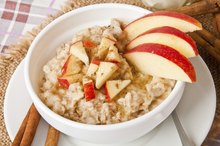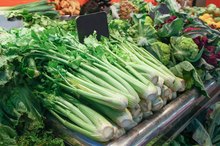What does fact checked mean?
At Healthfully, we strive to deliver objective content that is accurate and up-to-date. Our team periodically reviews articles in order to ensure content quality. The sources cited below consist of evidence from peer-reviewed journals, prominent medical organizations, academic associations, and government data.
The information contained on this site is for informational purposes only, and should not be used as a substitute for the advice of a professional health care provider. Please check with the appropriate physician regarding health questions and concerns. Although we strive to deliver accurate and up-to-date information, no guarantee to that effect is made.
Celery & Constipation
Constipation occurs when you are unable to have a bowel movement regularly. According to the National Digestive Diseases Information Clearinghouse, you may be constipated if you have not had a bowel movement in three days. Many lifestyle factors can affect your intestinal health, including your diet.
Causes of Constipation
Your dietary choices can lead to constipation 1. When you have constipation, stool moves too slowly through your intestine, which results in a hard, dry stool; the longer it is inside your intestine, the more water is removed. A weak intestinal tract may also lead to a reduction in the movement of stool, as may an obstruction such as a tumor or diverticulitis. Other factors causing constipation include a diet low in fiber, pregnancy, medications, a sedentary lifestyle and stress.
- Your dietary choices can lead to constipation 1.
- Other factors causing constipation include a diet low in fiber, pregnancy, medications, a sedentary lifestyle and stress.
Celery Solution
Foods That Help Clean the Impacted Feces From Your Colon
Learn More
Constipation may be solved with dietary changes 1. Increasing your fiber intake may be enough to help keep you regular. A diet adequate in fiber can keep you regular by increasing the size, weight and softness of your stool. When fiber is inside your digestive system, it retains water. This water retention makes for a softer, pliable and larger stool that is much easier for you to excrete.
- Constipation may be solved with dietary changes 1.
- When fiber is inside your digestive system, it retains water.
Contents of Celery
Celery is one food that reduces or prevents constipation 1. Most Americans do not eat enough fiber, according to the National Digestive Diseases Information Clearinghouse. The recommended intake of fiber is 20 to 35 grams per day. Including celery in a meal and a snack can offer a good portion of your fiber intake. One cup of celery contains nearly 2 grams of fiber. The water content of celery may also help. One cup of celery weighs 101 grams. Nearly 97 grams of this total weight is water. Increasing your intake of fluids can offer some relief form constipation.
- Celery is one food that reduces or prevents constipation 1.
- The water content of celery may also help.
Serving Suggestions
Side Effects of Glucomannan
Learn More
Pairing celery with peanut butter or a salad will increase your fiber intake even more. If you need to have a crunch with your sandwich, try substituting celery for chips or pretzels. Dip celery in hummus, low-fat ranch dressing or a light cream cheese mixed with chopped up vegetables.
Related Articles
References
- Jackson Siegelbaum Gastroenterology: Constipation
- USDA.gov: Celery, Raw
- Celery, raw. FoodData Central. U.S. Department of Agriculture. Published April 1, 2019.
- Anderson GH, Soeandy CD, Smith CE. White vegetables: Glycemia and satiety. Adv Nutr. 2013;4(3):356S-67S. doi:10.3945/an.112.003509
- Yusni Y, Zufry H, Meutia F, Sucipto KW. The effects of celery leaf (apium graveolens L.) treatment on blood glucose and insulin levels in elderly pre-diabetics. Saudi Med J. 2018;39(2):154-160. doi:10.15537/smj.2018.2.21238
- Eid HM, Nachar A, Thong F, Sweeney G, Haddad PS. The molecular basis of the antidiabetic action of quercetin in cultured skeletal muscle cells and hepatocytes. Phcog Mag 2015;11:74-81 doi: http:10.4103/0973-1296.149708
- Youl, E., Bardy, G., Magous, R., Cros, G., Sejalon, F., Virsolvy, A., Richard, S., Quignard, J., Gross, R., Petit, P., Bataille, D. and Oiry, C., Quercetin potentiates insulin secretion and protects INS‐1 pancreatic β‐cells against oxidative damage via the ERK1/2 pathway. British Journal of Pharmacology, (2010) 161: 799-814. doi:10.1111/j.1476-5381.2010.00910.x
- Tang GY, Meng X, Li Y, Zhao CN, Liu Q, Li HB. Effects of vegetables on cardiovascular diseases and related mechanisms. Nutrients. 2017;9(8). doi:10.3390/nu9080857
- Folate: Fact Sheet for Health Professionals. National Institutes of Health, Office of Dietary Supplements. Updated 2020.
- Vitamin A: Fact Sheets for Health Professionals. National Institutes of Health, Office of Dietary Supplements. Updated 2020.
- Fact or myth: does celery really have negative calories?. Carleton University Dining Services. Updated 2017.
- Allergenic foods and their allergens, with links to informall. University of Nebraska-Lincoln Institute of Agriculture and Natural Resources. Updated 2014.
- Why vitamin K can be dangerous if you take warfarin. Cleveland Clinic. Updated 2019.
- Barone M. Celery juice: Are the benefits real?. UC Davis Health. Updated 2019.
- Combs M H, Ernst M. Celery and celeriac. University of Kentucky College of Agriculture, Food and Environment Cooperative Extension. Updated 2019.
- Celery. University of Nebraska Lincoln Extension.
Writer Bio
Laura Niedziocha began her writing career in 2007. She has contributed material to the Stoneking Physical Therapy and Wellness Center in Lambertville, N.J., and her work has appeared in various online publications. Niedziocha graduated from Temple University with a Bachelor of Science in exercise science. She also has her Associate of Arts in communications from the Community College of Philadelphia.









